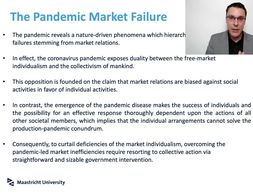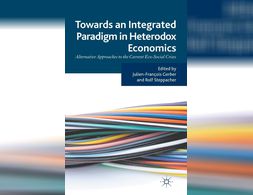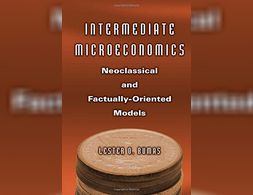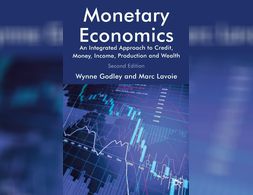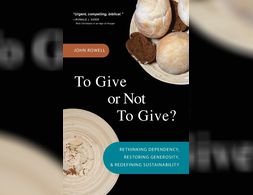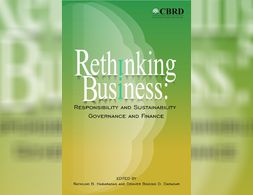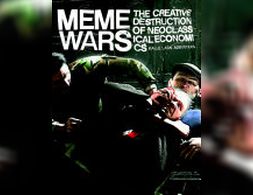✕
78 results
The Canadian author and journalist Richard Swift takes the listener on a journey to different degrowth projects. During the visits concepts of the degrowth movement are explained and practical examples are highlighted. In the elaborate programme different actors of the international degrowth movement get to speak (e.g. Joan Martinez Alier, Federico Demaria).
This lecture was held in the context of the a two day conference called Which pluralism for thinking about how to achieve a more sustainable and resilient economy The practices institutions and system logics of today s economy are not suitable for appropriately addressing fundamental human needs The climate crisis …
The human imprint on the biosphere has become so pronounced in recent years that there has been talk of a new geological era, the 'Anthropocene'.
In the second video of the series Investigating International Finance, an alternative view on capital controls is given contrasting with the paradigm of classical trade theory which suggests that the removal of trade and capital barriers is associated with higher market efficiency. After explaining the conceptual mechanisms underlying capital controls, examples are introduced where countries actually apply capital controls and how these controls have been associated with a lesser exposure to international financial crises spillovers.
In the second video of the series Investigating International Finance, an alternative view on capital controls is given contrasting with the paradigm of classical trade theory suggesting that the removal of trade and capital barriers is associated with higher market efficiency. After explaining the conceptual mechanisms underlying capital controls, examples are introduced where countries actually apply capital controls and how these controls have been associated with a lesser exposure to international financial crises spillovers.
In the interview, Robert Skidelsky discusses the emergence of political influence of a certain school of economic thought and how the success of an economic theory depends on the power relations in the society. He introduces the historical example of Keynesian economics and its replacement by liberal economic theory and policy in the aftermath of the Great Depression, and transfers this historical case to the dominant paradigm of austerity policies in the Europe as response to rising public debts caused by the Financial Crisis. He contrasts austerity policies with a Keynesian approach. Furthermore, he relates the targets of policy to the underlying power structures, for example when not the reduction of unemployment but the protection of financial capital is politically addressed.
Since Daniel Kahneman won the Nobel Memorial Price in Economic Sciences in 2002, a new branch of economics gained academic and popular interest. That is, the so-called area of behavioural economics. However, some scholars claim that this new area of economics is not changing much of the mainstream paradigm. Why?
Teaching feminist economics is a relatively new didactical project posing questions of content and methodology for instructors. The article proposes three possible topics with regard to the changing nature of the emergent research field: introducing feminist economics as a mode of questioning, showing its historicity and spectrum, and asking the question of a unifying paradigm.
This is the first intermediate microeconomics textbook to offer both a theoretical and real-world grounding in the subject. Relying on simple algebraic equations, and developed over years of classroom testing, it covers factually oriented models in addition to the neoclassical paradigm, and goes beyond theoretical analysis to consider practical realities.
This book challenges the mainstream paradigm, based on the inter-temporal optimisation of welfare by individual agents. It introduces a methodology for studying how institutions create flows of income, expenditure and production together with stocks of assets and liabilities, thereby determining how whole economies evolve through time.
Modern mission theory is guided largely by the three self paradigm that suggests indigenous churches can only be healthy if they are self-governing, self-propagating, and self-supporting. Consequently, Western missionaries, their churches, and their agencies have been increasingly indisposed to giving generously. We must rethink the interplay of dollars dependency and what it means to do the right thing with our money as we pursue twenty-first century missions.
Rethinking Business is a volume of thought-provoking researches that sets out to challenge the paradigm of business along the areas of governance, finance, corporate social responsibility, and sustainability.
This paper starts with an evaluation of three common arguments against pluralism in economics: (1) the claim that economics is already pluralist, (2) the argument that if there was the need for greater plurality, it would emerge on its own, and (3) the assertion that pluralism means ‘anything goes’ and is thus unscientific. Pluralist responses to all three arguments are summarized. The third argument is identified to relate to a greater challenge for pluralism: an epistemological trade-off between diversity and consensus that suggests moving from a discussion about ‘pros’ and ‘cons’ towards a discussion about the adequate degree of plurality. We instantiate the trade-off by showing how it originates from two main challenges: the need to derive adequate quality criteria for a pluralist economics, and the necessity to propose strategies that ensure the communication across different research programs. The paper concludes with some strategies to meet these challenges.
In this essay the authors take a look at how welfare could be provided in a degrowth society.
Dependency in Central and Eastern Europe - Self-reliance and the need to move beyond economic growth
In this essay, the author takes a critical perspective on the pursuit of growth as the solution for providing for environmental sustainability and economic stability in the countries of Central and Eastern Europe.
Drawing from the framework of dependency theory and presenting brief insights into European core-periphery relations the author then argues for the implementation of an alternative strategy to development that is built around the concept of self-reliance.
In this essay the authors argue for a wider concept of care work that includes community building, civic engagement and environmental activism. On the basis of the case of Cargonomia, a grassroot initiative in Budapest, they show that such a wider concept of care work could allow for different narratives that promote sustainable lifestyles with a milder environmental and social impact on the planet and its communities.
From the two premises that (1) economies are complex systems and (2) the accumulation of knowledge about reality is desirable, I derive the conclusion that pluralism with regard to economic research programs is a more viable position to hold than monism. To substantiate this claim an epistemological framework of how scholars study their objects of inquiry and relate their models to reality is discussed. Furthermore, it is argued that given the current institutions of our scientific system, economics self-organizes towards a state of scientific unity. Since such a state is epistemologically inferior to a state of plurality, critical intervention is desirable.
Due to the IMF’s focus on gender budgeting, this essay will mainly examine its gender budgeting recommendations as an example of its general inclination towards gender issues and its conception of gender equality. What does the IMF’s focus on gender equality really mean from a critical feminist perspective? What are its main objectives? What does it seek to change and to maintain? What concept or idea of women does it follow and what are the underlying theoretical foundations?
Introduction Economics is by necessity a multi paradigmatic science Several theoretical structures exist side by side and each theory can never be more than a partial theory Rothschild 1999 Likening scientific work to the self coordinating invisible hand of the market Michael Polanyi cautioned strongly against centralized attempts to steer …
Completing the Economics of Discrimination module, the students should have acquired knowledge and understanding of the existing similarities and differences of the definition and analysis of discrimination across economic theory and cultural theory.
A review of:
[1] Intermediate Microeconomics, H.R. Varian
[2] Mikrooekonomie, R.S. Pindyck, D.L. Rubinfeld
[3] Grundzuege der mikrooekonomischen Theorie, J. Schumann, U. Meyer, W. Stroebele
The global financial crisis (GFC) led to increasing distrust in economic research and the economics profession, in the process of which the current state of economics and economic education in particular were heavily criticized. Against this background we conducted a study with undergraduate students of economics in order to capture their view of economic education.
This course provides future change makers in public and private sectors with a comprehensive overview on the structures and actors that shape markets.
The premise of this workshop is that we, as knowledge producers - especially within westernized universities (Grosfoguel, 2013), are significantly implicated in neoliberal imaginaries that are often in service of hierarchical, binary, competitive and linear narratives of growth as civilizational progress.
Austrian economics focuses on the economic coordination of individuals in a market economy. Austrian economics emphasises individualism, subjectivism, laissez-faire politics, uncertainty and the role of the entrepreneur, amongst others.
Post-Keynesians focus on the analysis of capitalist economies, perceived as highly productive, but unstable and conflictive systems. Economic activity is determined by effective demand, which is typically insufficient to generate full employment and full utilisation of capacity.
Complexity economics focuses on interactions and interdependencies between individuals and structures in economic systems. Those are systems of organised complexity. High importance is given to the analysis of networks.
After completing the module, participants should be able to analyse the concepts of degrowth, ecological unequal exchange, Green New Deal, and embeddedness by applying theories situated within the fields of academic research of Ecological Economics and Political Ecology.
This syllabus provides an overview of the contents of the course "Understanding Economic Models" at the University of Helsinki.
The first day of the workshop is intended to initiate students to the foundational concepts of ecological economics. Ecological economics is an ecological critique of economics, applying the energetics of life to the study of the economy. It also investigates the social distribution of environmental costs and benefits. It does so by deconstructing concepts that are taken for granted like “nature” or “the economy”, excavating their ideological origins.
The U.S. economy today is confronted with the prospect of extended stagnation. This book explores why. Thomas I. Palley argues that the Great Recession and destruction of shared prosperity is due to flawed economic policy over the past thirty years.
From the editor and magazine that started and named the Occupy Wall Street movement Meme Wars The Creative Destruction of Neoclassical Economics is an articulation of what could be the next steps in rethinking and remaking our world that challenges and debunks many of the assumptions of neoclassical economics and …
We use cookies on our website. Click on Accept to help us to make Exploring Economics constantly better!


